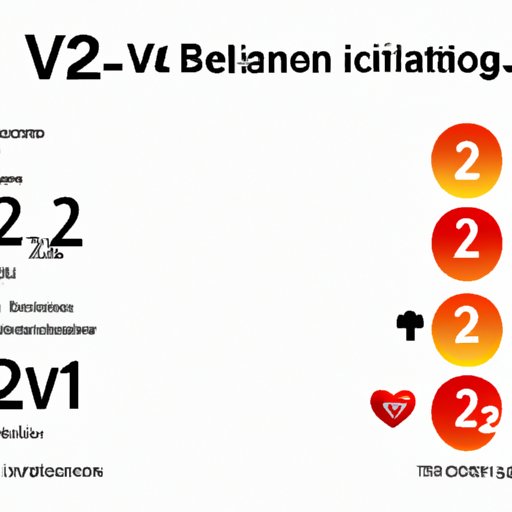
Introduction
Low white blood cell count can be a matter of concern, as it puts the body at risk of contracting infections. An adequate number of white blood cells is essential to keep the immune system functioning effectively. Vitamin B12 supplementation is believed to support white blood cell health, with many people taking supplements to increase their white blood cell count. In this article, we will explore the link between vitamin B12 and white blood cell production, the role of vitamin B12 in immune function, and the potential benefits and risks of supplementing with vitamin B12 to boost immune function.
Understanding the Role of Vitamin B12 in White Blood Cell Production
White blood cells are a vital component of the immune system. These cells are responsible for fighting off infections and diseases by identifying, attacking, and eliminating foreign invaders in the body. Vitamin B12 plays a crucial role in white blood cell production, as it is required for DNA synthesis and cell division. Without vitamin B12, the body cannot produce enough white blood cells to fight infections effectively.

How Vitamin B12 Deficiency Can Affect White Blood Cell Count and Immune Function
Vitamin B12 deficiency is a common cause of low white blood cell count and impaired immune function. The body does not produce vitamin B12 on its own, and it must be obtained through the diet. People who follow a vegan or vegetarian diet, as well as older adults, are more likely to suffer from vitamin B12 deficiency. This deficiency can lead to megaloblastic anemia, a condition where red blood cells are enlarged and cannot function correctly. Vitamin B12 deficiency can also affect white blood cell count by slowing down the rate of cell division, leading to decreased production. Moreover, it can suppress the immune system, making the body more vulnerable to infections.
The Connection between Vitamin B12 and Other Essential Nutrients that Support White Blood Cell Health
Other critical nutrients that support white blood cell health are vitamin B6, folate or vitamin B9, vitamin C, and vitamin E. Vitamin B6 aids in the synthesis of white blood cells, while folate and vitamin C are essential for DNA synthesis during white blood cell production. Vitamin E plays a critical role in enhancing the immune system’s function by protecting white blood cells from oxidative damage, and it also has antimicrobial properties. Vitamin B12 works together with other essential nutrients to support white blood cell production and keep the immune system healthy.
Scientific Studies Investigating the Link between Vitamin B12 and the Immune System
Several studies have been conducted to investigate the link between vitamin B12 and the immune system. One study published in 2006 examined the association between vitamin B12 and immune function in older adults. The researchers found that low vitamin B12 levels were linked to decreased white blood cell count, weak immune response, and increased risk of infections. Another study published in 2013 examined the effects of vitamin B12 supplementation on the immune response in healthy adults. The study reported that vitamin B12 supplementation increased the number of white blood cells, enhanced immune function, and improved resistance to infections.
The Benefits and Potential Drawbacks of Supplementing with Vitamin B12 to Boost White Blood Cell Count
Vitamin B12 supplementation may offer several benefits for individuals struggling with low white blood cell count and impaired immune function. A study conducted on older adults found that supplementing with vitamin B12 increased the number of white blood cells and improved the immune response. Vitamin B12 supplements have also been shown to be effective in treating megaloblastic anemia caused by vitamin B12 deficiency. However, excessive consumption of vitamin B12 can lead to toxicity, causing symptoms such as skin rashes, itching, and abdominal pain. Therefore, it is essential to speak to a healthcare professional before starting any vitamin B12 supplement regimen to avoid any health risks.
Dietary Sources of Vitamin B12 for Those Looking to Naturally Support Their Immune System
Vitamin B12 is commonly found in animal-based products such as meat, fish, dairy, and eggs. Vegetarians and vegans can obtain vitamin B12 through fortified foods like breakfast cereals, soy milk, and plant-based meat substitutes. Nutritional yeast is also an excellent source of vitamin B12. It is important to consume an adequate amount of vitamin B12 to support white blood cell production and maintain a healthy immune system.
How Healthcare Professionals May Use Vitamin B12 Levels to Evaluate Immune Function and Overall Health
Healthcare professionals may use vitamin B12 levels to evaluate immune function and overall health. A blood test measures the amount of vitamin B12 in the blood, which can indicate a vitamin B12 deficiency. Vitamin B12 levels may also be used to diagnose megaloblastic anemia and evaluate the effectiveness of vitamin B12 supplements.
Conclusion
Vitamin B12 plays a vital role in white blood cell production and immune function. Vitamin B12 deficiency can lead to low white blood cell count and weaken the immune system, making the body more susceptible to infections. Vitamin B12 supplementation can improve white blood cell count and enhance immune function, but it is important to seek guidance from a healthcare professional to avoid vitamin B12 toxicity. Consuming foods that are rich in vitamin B12 can naturally support white blood cell health and keep the immune system healthy.
Recommendations
For individuals experiencing low white blood cell count or weakened immune system, it is essential to incorporate foods that are rich in vitamin B12 into their diet. If vitamin B12 deficiency is suspected, it is vital to speak to a healthcare professional to get vitamin B12 levels measured and follow their advice. People looking to supplement with vitamin B12 should ask their healthcare professional or a qualified nutrition specialist for guidance on proper dosage and possible side effects.





